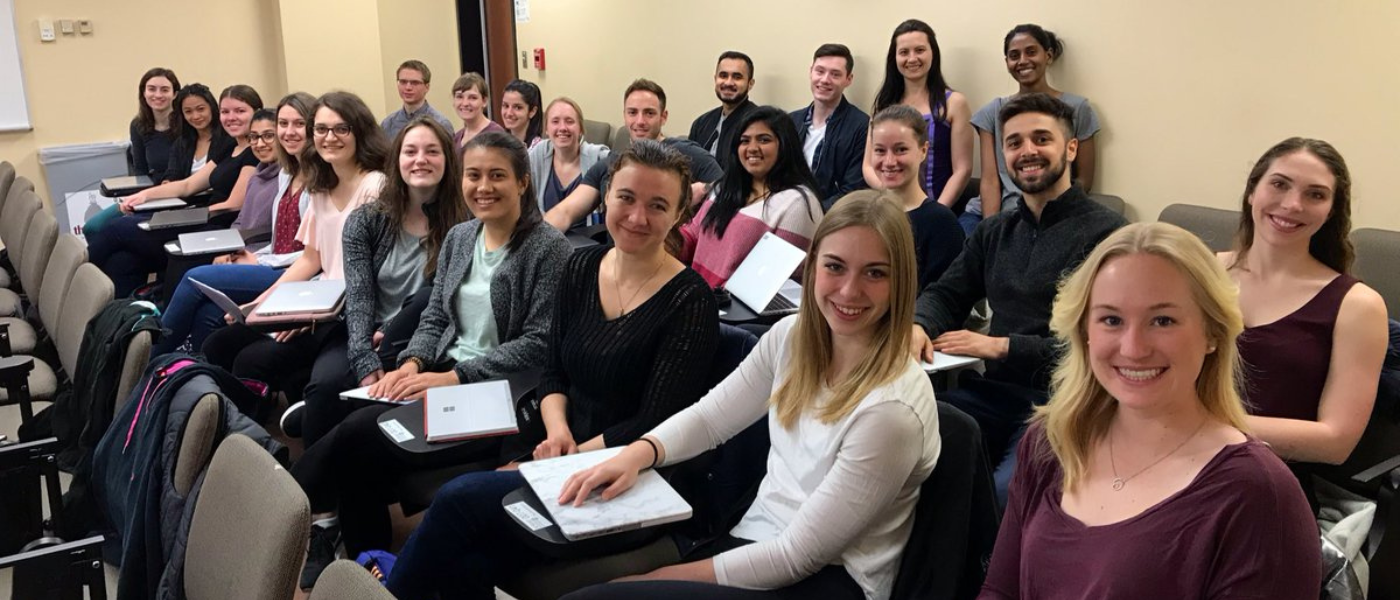Education
The PA Education Program is a two-year course of study delivered over a 24-month period beginning in September. Year 1 will focus on the study of the clinical sciences underpinning health care delivery. Year 2 will consist of clinical training delivered in the consecutive 12-month period. The PA program will lead to a health professional, second entry degree: Bachelor of Health Sciences (Physician Assistant) degree.
Distance education is not available.
Full-Time Status
The structure of the program requires that all students be registered in the program on a full-time basis and attendance in all components of the Program is mandatory.
Year I: Clinical Sciences
The 48-week clinical sciences curriculum is modeled on the McMaster Medical School COMPASS Curriculum as is designed to meet the profession’s “Entrustable Professional Activities” (EPAs) PA profession (PDF) and required competencies (Canadian Association of Physician Assistants), and the EQual Health Education Accreditation requirements through Accreditation Canada. The PA program is accredited by EQual of Accreditation Canada . The curriculum will be delivered in small group problem-based learning modules with a focus on the physician assistant’s role in health care and the promotion of inter-professional education and training.
The clinical sciences curriculum consists of three Medical Foundations composed of the following components:
- Clinical Sciences (PBL tutorials)
- Interviewing, Examination and Reasoning (IER)(Clinical Skills)
- Professional Competencies (ProComp)
- Early Clinical Exposure
- Medical Communications
- Anatomy Sessions
- Medical Simulations (SIMs)
- Large Group Sessions (LGS)/Workshops
- Interprofessional Education Activities
Expandable List
- Clinical Science: This unit begins with the foundations of medical sciences, including basic introductions to neoplasia and immunology. This is followed by the key feature of the respiratory, cardiovascular, and renal systems.
- IER: Basic communication skills, history taking and physical examination.
- ProComp: Professionalism, the role of the PA, principles and structure of the health care system, chronic disease, determinants of health
- Early Clinical Exposure Placements
- Clinical Science: This unit introduces students to aspects of hematology, gastroenterology, endocrinology and reproduction.
- IER: Continued development of communication skills, history taking and physical examination with additional focus on GI, endocrine and obstetric and gynecologic systems.
- ProComp: Medical ethics and medical decision making.
- Early Clinical Exposure Placements
- Clinical Science: This unit focuses on movement, interaction and communication covering the musculoskeletal system, and the brain and behavioral medicine.
- IER: Continued development of communication skills (negotiation and conflict resolution), history taking and physical examination with additional focus on the neurologic, psychiatric and musculoskeletal systems.
- ProComp: Standards of care, laws and codes relevant to medical practice, institutional policies, mental health and society, breaking bad news, end of life decision-making, resource allocation
- Early Clinical Exposure Placements
Year II: Clerkship
In the second year of the program, students will undertake approximately 48 weeks of supervised clinical placements. Core (program arranged) and Selective (student selected, program arranged) placements will take place in family medicine, pediatrics, geriatrics, internal medicine, surgery, emergency medicine, and psychiatry. Placements will take place in Hamilton, in the expanded McMaster campuses of St. Catharines and Kitchener/Waterloo, as well as in the broader Ontario community. Elective (student selected, program approved) placements will round out the balance of the clinical year and will allow students to pursue additional career interests. Students are responsible for arranging travel accommodations for clinical rotations.
Students complete 48-weeks of rotations in core (40 weeks) and elective (8 weeks) blocks:
• Family Medicine (8 weeks) – community based
• Psychiatry (4 weeks) – community or hospital based
• General Surgery (4 weeks) – hospital based
• Surgery Selective (4 weeks) – community or hospital based
• Internal Medicine (4 weeks) – hospital based, may have some out-patient component
• Medicine Selective (4 weeks) – community or hospital based
• Pediatrics (4 weeks) – hospital or community based
• Emergency Medicine (4 weeks) – hospital based
• Geriatrics (4 weeks) – hospital or community based
• Elective I (4 weeks) – hospital or community based
• Elective II (4 weeks) – hospital or community based
Canadian Armed Forces (CAF) students also complete 48-weeks of clerkship rotations, which are distributed into 14 core (46 weeks) and one elective (2 weeks):
• Family Medicine (6 weeks)
• Psychiatry (4 weeks)
• General Surgery (4 weeks)
• Internal Medicine (4 weeks)
• Pediatrics (4 weeks)
• Emergency Medicine (4 weeks)
• Geriatrics (2 weeks)
• Anesthesia (2 weeks)
• ENT (2 weeks)
• Trauma (4 weeks)
• Ortho (2 weeks)
• Urology (2 weeks)
• Obstetrics/Gynecology (2 weeks)
• Sports Medicine (4 weeks)
• Elective (2 weeks)
Travel within the Program
Students are responsible for arranging their own travel to and from learning settings external to the University (regardless of site). Students who enroll in the PA Education Program are expected to travel to learning settings in the Hamilton and surrounding area, including but not limited to Halton, Peel, Brant, Haldimand-Norfolk, Niagara, Kitchener-Waterloo, Toronto, and other Ontario clinical sites.
Certification
Graduates will qualify to challenge the National Certification Exam through the PA Certification Council of Canada (PACCC) in order to practice as a certified PA in Canada.



